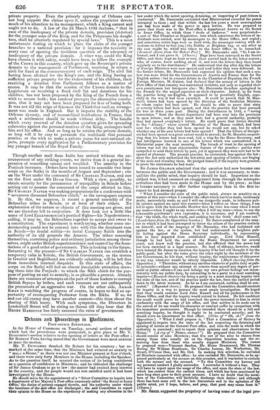Though another mail from India has arrived without the an-
nouncement of any striking events, we derive from it a general im- pression of something uneasy and troubled. The anarchy in the Punjaub increases. Orders have been issued to assemble two large corps on the Sutlej in the months of August and September ; one on the West under the command of Sir CHARLES NAPIER, and one on the East under Sir HUGH Gouuw. With a view, possibly, to obtain security for the permanence of tranquillity in Scinde before setting out to assume the command of the corps allotted to him, Sir CHARLES NAPIER was making preparations for a conference with " seventeen thousand Beloochee chiefs," as the newspapers express it. By this, we suppose, is meant a general assembly of the Beloochee tribes in Scinde, or at least of their elders. No explanation of the nature or objects of this meeting are given, and we are therefore left to conjecture. It does look not a little like some of Lord ELLEHBOROUGH'S poetical flights—his Napoleonisms ; calling, it may be, the Beloochees together to accept and swear to a constitution. The experiment is worth trying, whether some un- derstanding could not be entered into with this the dominant race in Scinde—its feudal militia—to instal Company Sahib into the authority of its old generals the Ameers. The tribes assessing themselves, exercising police and ordinary jurisdiction among them- selves, might under British superintendence and control lay the foun- dations of a good order of government. This is looking to the future. Returning to the present—if Sir CHARLES NAPIER can establish a temporary calm in Scinde, the British Government, as the storms in Gwalior and Boghilkund are evidently subsiding, will be left free from immediate internal' disquiets. In this state of affairs, the corps on the Sutlej will feel an almost irresistible attraction draw- ing them into the Punjaub : to attack the Sikh chiefs for the pur- pose of putting an end to anarchy, is so plausible a pretext. Already there are rumours of attempts on the part of those leaders to corrupt British Sepoys by bribes, and such rumours are not unfrequently the precursors of an aggressive war. On the other side, ARBAR KHAN is watching the progress of events, in hopes to find an op- portunity of reconquering Peshawur from the Sikhs. If so, we and our old enemy may have another contest—this time about the sharing of Sikh booty. With such symptoms, the Directors in Leadenhall Street will be sitting on thorns till they hear that Sir HENRY HARDINGE has fairly assumed the reins of government.


























 Previous page
Previous page